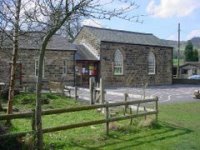Combs – A Community with Spirit

In the mid-sixties, Marguerite Bellhouse, long-term resident of Combs, wrote an in-depth book about the village. Only last winter this book was reprinted by popular demand from a whole new generation of Combs residents. This is the nature of Combs. It has an incredibly strong identity and a tremendous sense of place, neither of which should be underestimated or treated so casually by Derbyshire County Council who insist on believing it is a community of relatively wealthy middle class commuters driving 4x4s and enjoying a village school where the children get the equivalent of a private education at the cost of other children in Derbyshire.
The geology and geography of Combs is one of the key things that gives the village this strong sense of place (and if residents have 4x4's it's usually because they need one to work their land or get to their houses in our harsh winters). Combs takes its name from the horseshoe of gritstone hills that embrace it at the south, east and westerly end of the valley. This ‘glacial hollow’ opens out at the northern end until cut off by the hills of Eccles Pike. The first record of a settlement in this valley was in the 13th century but the history stretches back much further – there is an iron age fort (possibly earlier) at Castle Naze and the Romans undoubltedly passed through here as did the Saxons. ‘Cum’ in Saxon means ‘Curved Ground’ and ‘Cumbas’ means valley – likely derivations for the name of the village and placing it firmly in its geographical setting.
The main industry in Combs, until recent times, has been farming, but there has also been a brewery, a mill, weaving, quarrying and smithies. There have been a number of shops in different buildings around the village over the years, sometimes doubling up as a post office. The last one closed over 10 years ago. The last dairy herd was sold three years ago. There is still a milk round. There is still sheep farming and a small beef herd and one of the farmers has diversified into hanging baskets. The Beehive pub thrives, but increasingly with visitors from all around as it offers good dining. If the school, village hall and chapel were to go, the pub would be the only amenity left in the village. There is a small playground in the corner of a field next to the school courtesy of the Village Hall Trust and the funds raised from the Combs Fun Day every August. The publican donated his old outside tables when he bought new ones for the pub so that parents can sit and watch their children play. This playground is full of the sound of happy children’s voices at the end of school, and would undoubtedly be a quieter, sadder place if the school were to shut. .JPG)

No comments:
Post a Comment